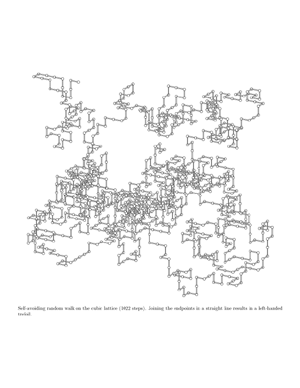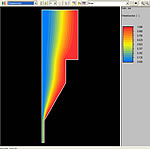


http://www.cs.ubc.ca/nest/imager
/contributions/scharein/thesis/fav.html
During the last decades, there are uncountable breakthrough research works in polymer science and engineering (e.g., tailor-making polymer with predefined structures, self-assembly molecules, conductive polymer, understanding DNA and protein structure). These drastic improves in our understanding of these fascinating materials and abilities to exploit the practical usages are due to the numerous research affords from researchers in physics, chemistry, chemical engineering, mechanical engineering, material science and engineering, and computer science and engineering. This shows the multidisciplinary nature of the subject, which will continue to be so in the future. As people say, what is challenging is now at the interface of the knowledge from different conventional areas, where the academic line is blurred.
Polymer
chain conformation |
Polymer
morphology |
Polymer
processing |
 |
 |
 |
http://www.cs.ubc.ca/nest/imager |
www.imc.cas.cz/en/imc/ mater/morpho/Morpho.html | www.flemingptc.co.uk/ |
The main research focus of our group is in the area of computational polymer science and engineering, exploiting the unprecedented computation power of today to the world of advanced materials. Our goal is to elucidate the fundamental mechanism and to compliment the research effort of experimentalists by providing useful guideline for the way to design, produce, characterize, and process new generation of polymeric materials. The research activities are planed to cover the whole spectrum of problems: the microscopic level (e.g., polymer chain microstructure, chain conformation), the mesoscopic level (e.g., polymer morphology, phase separation), and the macroscopic level (e.g., polymer processing, polymer process system). A wide variety of tools (e.g., statistical mechanics, conventional computational fluid dynamics, large scale process simulation, artificial intelligent) have been developing and used for attacking several challenging problems. Although we mainly focus on the computational tools, many problems that are under investigated have potential practical applications and are of interests for experimentalist, therefore they are frequently experimental testable.
Our group are currently
on the lookout for motivated graduate students (with fair computation skill). If you are interested in pursuing your graduate study
in our group, please contact Dr. Siripon Anantawaraskul at fengsia [at] ku [dot]
ac [dot] th with appropriate information on your background. The students will
have a chance to receive various forms of financial supports (research assistant
(RA), teaching assistant (TA), fee waiver, and an additional monthly expense),
depending on their performance and academic background. Those interested should
also visit the homepage of chemical engineering department, Kasetsart University,
for further information.